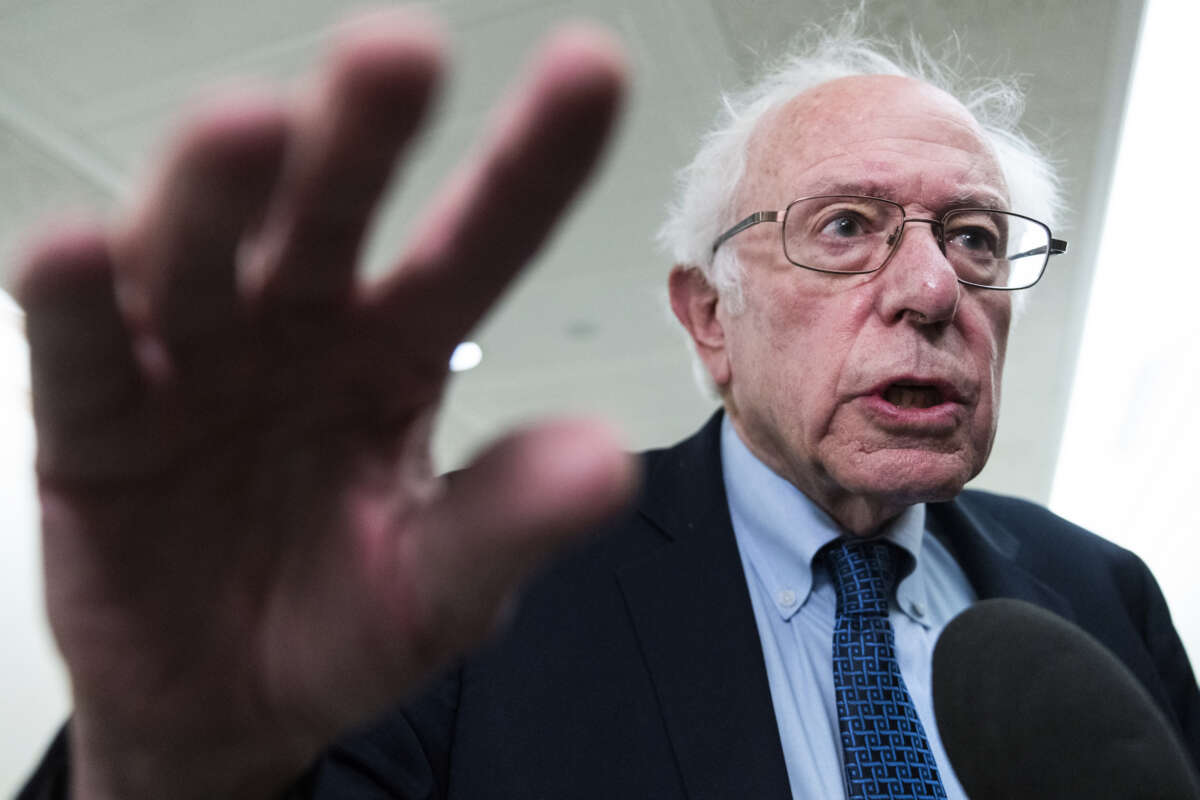Honest, paywall-free news is rare. Please support our boldly independent journalism with a donation of any size.
Gregory Becker is the CEO of Silicon Valley Bank, the second largest bank to fail in U.S. history. He was also, up until the day the bank failed on March 10, a member of the board of directors of the Federal Reserve Bank of San Francisco, one of 12 Federal Reserve Banks in the country charged with keeping institutions like Silicon Valley Bank healthy and solvent.
Sen. Bernie Sanders (I-Vermont) is on a quest to prevent people like Becker from serving in such positions again. On Thursday, Sanders introduced a bill that would block bank executives from serving on regional Federal Reserve Banks that regulate the very banks they run — an extremely common practice that Sanders points out bank executives frequently abuse in order to gain favor for their institutions.
The aim of the Federal Reserve Independence Act is to prevent the natural “conflicts of interest” that arise when a bank executive serves in a body that is supposed to rein in the institution that they run. It would also prevent Fed employees and board members from owning stock in any of the institutions under the Fed’s purview.
“I think it would come as a shock to most Americans to find out that Gregory Becker, the CEO of Silicon Valley Bank, who successfully lobbied for the deregulation of his financial institution was allowed to serve as a director of the same body in charge of regulating his bank: the San Francisco Federal Reserve,” Sanders said in a statement about the bill.
“It is clear to me and to the American people, that the CEOs of the largest banks in America should not be allowed to serve as directors of the main agency we have in this country in charge of regulating those very same financial institutions,” he continued. “The Fed has got to become a more democratic institution that is responsive to the needs of working people and the middle class, not just CEOs of some of the largest financial institutions in America.”
The bill has been endorsed by several organizations, including Public Citizen, Revolving Door Project and the Working Families Party. It has also been endorsed by the Association of Flight Attendants-Communications Workers of America.
“For far too long the Federal Reserve has been helmed by bank executives and former Wall Street financiers, allowing bank control over the very institution tasked with their regulation,” Revolving Door Project researcher Henry Burke said in a statement emailed to Truthout. “Preliminary investigations into the collapse of Silicon Valley Bank have made it clear that not only did the Fed pursue a deregulatory regime that helped create the conditions for the bank’s failure, but Fed officials ignored glaring signs of mismanagement by the executives at SVB in the months leading up to its failure.”
“The American people should be able to rest assured that the Fed is pursuing their best interests — not those of the wealthy bank executives that serve on its board,” Burke continued.
Silicon Valley Bank and Signature Bank, a crypto lender which also recently collapsed, both aggressively lobbied for a 2018 law that overhauled many regulations in the Dodd-Frank law, enacted after the Great Recession to prevent major bank failures. These deregulatory actions, as well as further deregulatory actions from Federal Reserve Chair Jerome Powell, have been largely blamed for the failures of the banks, alongside the extreme focus on profits over everything else at the banks themselves.
According to a press release on the bill, two-thirds of directors on the 12 Federal Reserve Boards are “hand-picked” by the banks that are overseen by the Federal Reserve. Sanders’s office also points out that there are currently five top executives of financial institutions that control over $150 billion in assets serving as regional Federal Reserve directors — institutions that, thanks to the 2018 repeal, aren’t subject to the sort of regulatory scrutiny that lawmakers like Sanders say could have prevented the failures.
Other major bank executives have served on regional Federal Reserve boards in the past, raising other examples of potential conflicts of interest, Sanders says.
A Dear Colleague letter signed by Sanders brings attention to the fact that JP Morgan Chase CEO Jamie Dimon sat on the New York Fed board when, during the Great Recession, the Federal Reserve gave $391 billion in assistance to Chase, as one of the banks that received money in an almost zero interest loan during the crisis, the Government Accountability Office found in a report commissioned by Sanders in 2011.
Media that fights fascism
Truthout is funded almost entirely by readers — that’s why we can speak truth to power and cut against the mainstream narrative. But independent journalists at Truthout face mounting political repression under Trump.
We rely on your support to survive McCarthyist censorship. Please make a tax-deductible one-time or monthly donation.
